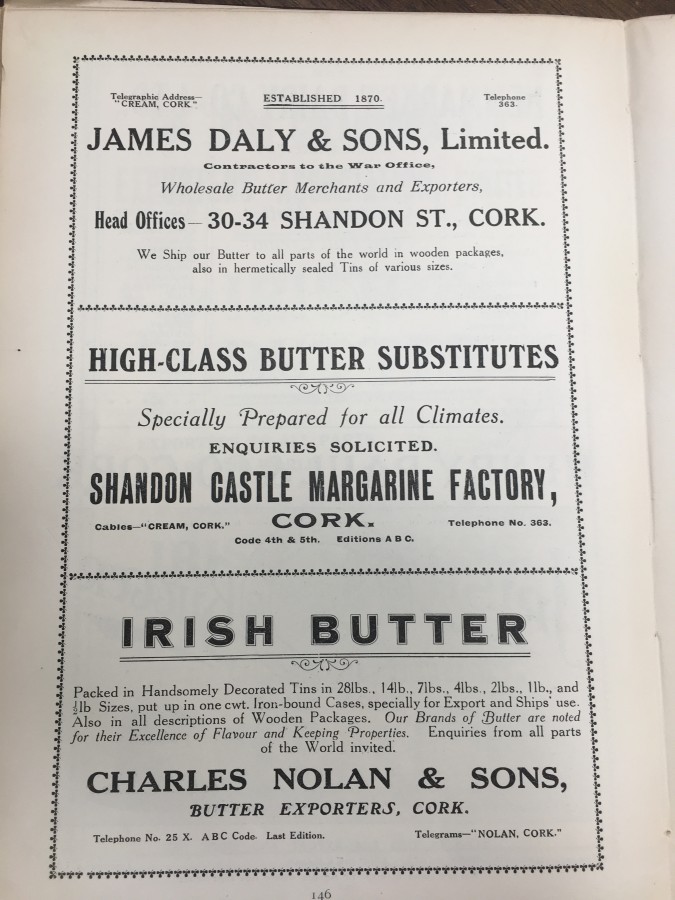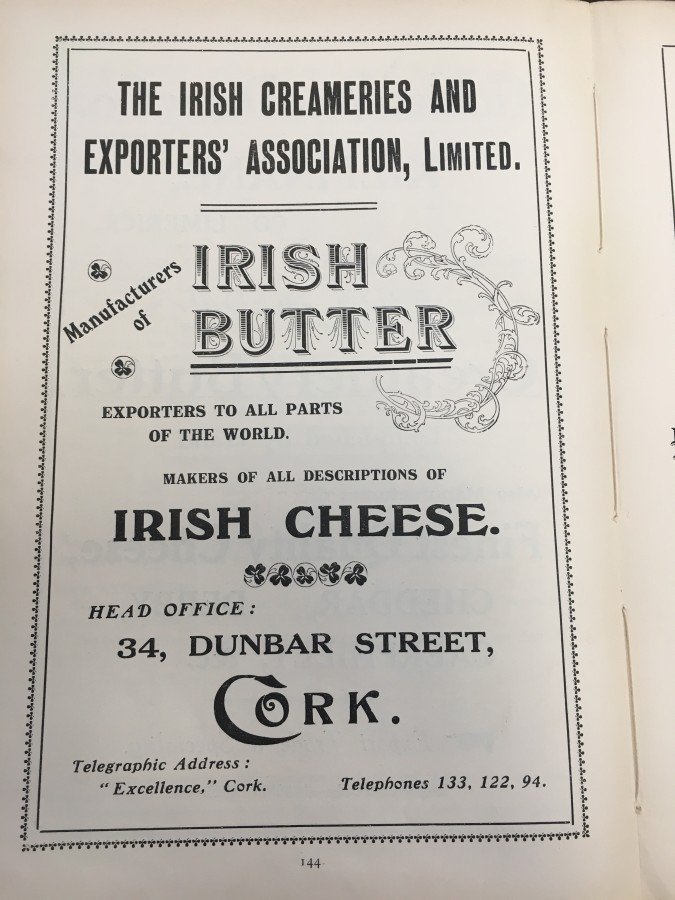Kieran’s Our City, Our Town Article,
Cork Independent, 11 January 2018
Stories from 1918: Matters of Sugar and Butter
As World War I raged, rationing of food stuffs continued. The British Ministry of Food set up a food control committee for Ireland on 31 August 1917 and many of its regulations, in theory, applied to this country. In Great Britain there were Local Food Control Committees whilst in Ireland the administrative duties were initially entrusted to one control body, the Food Control Committee for Ireland. However, the Committee eventually on 13 December 1917 conferred local committees with the authority to fix retail prices of food supplies.
One hundred years ago this week, the second week of January 1918, the Food Control Committee of Ireland issued an order, and published it every major newspaper including the Cork Examiner. Entitled “The Sugar Order (Ireland), 1917”, it contained provisions with reference to a rationing scheme of sugar distribution in Ireland, which were similar to those contained in the Sugar Order 1917, relating to Great Britain. Under the provisions of the Irish Order from 6 January manufacturers and caterers in Ireland had their supplies of sugar regulated by the authorities and institutions, and from 3 March retailers and wholesalers were restricted. It was an offence from these respective dates to supply the different “classes of purchasers” with sugar except against vouchers duly issued.
The task of the distribution of sugar cards in Cork was entrusted to the members of the Royal Irish Constabulary. By the second week of January, the task was almost completed – except for a few cases where persons were absent from their places of abode during the Christmas holidays, or where some last moment persons were just too late in making their needs known to the authorities. Provisions were made for everyone.
By mid January, all sugar card holders in Ireland had to be registered with their respective grocers who retained half the card. Grocers in the weeks before the scheme came into operation made their arrangements with the Ministry of Food for a regular supply of sugar to meet the needs of their customers, in accordance with the number of cards lodged with them. Questions were asked as to what quantities of sugar were to be given to adults and children. It was taken for granted that the adults’ ration would be half-a-pound per week, as was the case in England. It was believed that in the case of children under, sixteen that a slightly larger allowance was to be made. The system of receipt and checking of the rations as sold by the retailer to his customers was also an issue.
As sugar cards were been shared with the general public, the Irish Food Control Committee issued an appeal to the public to “exercise as much economy as possible in the use of essential foods, especially bread, butter, milk, and sugar”. The Committee suggested that bread and butter should be served only at breakfast. Eating bread at luncheon or dinner was according to them “merely an unnecessary habit for those who can afford fish, meat and vegetables”. Butter it was stated, was so scarce that “any saving in the quantity hitherto used would be of assistance”.
To discuss the butter shortage crisis, a meeting of the members of the Irish Butter Trade Association was held on the 9 January at the Cork Butter Market. Mr D Horgan presided. Compared to one hundred years previously, the Cork butter trade was on a slow decline. Further national regulation or even control of the market was not welcome. The Chairman at the outset said the meeting had been called to consider the “attitude of the Irish Food Control Committee” in connection with the distribution, control of grading and rationing of Irish butter, and the possible surplus supply during the ensuing season. The matter was of great consequence to the dairy farmers of the country, and to all connected with the butter trade. Mr Horgan expressed a view on behalf of all the members, that it would be a terrible blow if the Government assumed control and set the direction of the butter trade of Ireland, and that “if it became permanent it would be a disaster”. Cork butter had been locally inspected and graded for over 150 years. He publicly called for strong efforts of their Parliamentary representatives, to invoke their influence on stopping the giving over a great deal of power to government to control the butter trade.
The following resolution was proposed by Mr Dale: “That the Irish Butter Trade Association are of opinion that the Government should make arrangements to have all grading of Irish butter carried out at this side, but if such an arrangement could not be made Irish butter should be sold at one flat price”.
A debate ensued by several members. Mr Roche said they all approved of the resolution to a certain extent—that the grading should be done at this side, but that within the British export market, finance because of the war was invested in lower quality grade butter, which decreased support for high quality products, and ultimately eroded the grading process. Ultimately if the demand for Irish butter deteriorated at the other side it would be hard financially on Irish exporters.
Mr Dale proposed an amended resolution: “The Irish butter trade are strongly of opinion that the grading of Irish butter is quite unnecessary in Britain as shippers will ship under their usual brands; but in the event of grading being insisted on, the trade believe it would be disastrous to Irish trade interests were it to be done outside Ireland”. The resolution was agreed to and sent on to the Irish Food Control Committee.
Captions:
928a. Ad for Cork Butter Merchants 1919, from Cork: Its Chamber and Commerce (source: Cork City Library)
928b. Ad for Cork Butter Merchants 1919, from Cork: Its Chamber and Commerce (source: Cork City Library)

